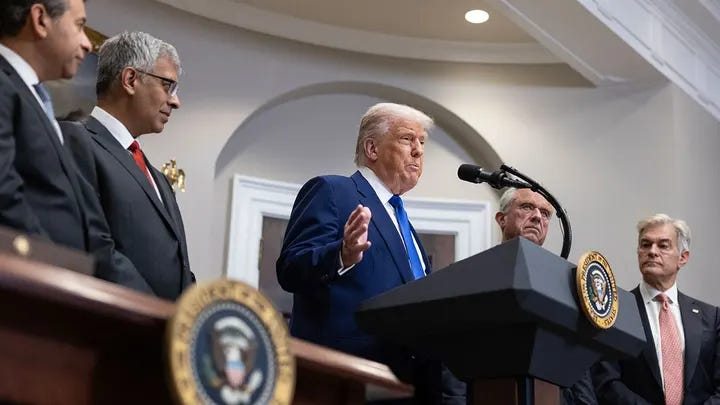Today's News: Dispute Over Fiscal Impact of Trump’s Tax and Spending Bill
The CBO and other analysts estimate the bill would add $2.4 to $2.8 trillion to the federal deficit over the next decade, despite Republican claims of fiscal responsibility.
Photo: Tom Brenner for The Washington Post
Overview
Date: June 4, 2025
Topic: Dispute Over Fiscal Impact of Trump’s Tax and Spending Bill
Summary: President Donald Trump's proposed “Big, Beautiful Bill” has ignited a political and economic firestorm. The Congressional Budget Office (CBO) and other analysts estimate the bill would add $2.4 to $2.8 trillion to the federal deficit over the next decade, despite Republican claims of fiscal responsibility. The bill includes extensions of 2017 tax cuts, new cuts including the elimination of taxes on tips, and reductions to welfare and healthcare spending. Trump allies, including the White House, dispute the budget math, predicting economic growth and tariff revenue will offset the cost. However, critics from across the political and economic spectrum—including Elon Musk—have denounced the proposal, and Senate Republicans are split over its details. The White House has also mounted an aggressive campaign to discredit the CBO, accusing it of partisan bias, though independent analysis strongly disputes those claims.
Sources
The New York Times – Republicans Try to Discredit Experts Warning About the Cost of Tax Cuts
CNN – The White House’s fuzzy math is starting to haunt the ‘Big, Beautiful Bill’
Fox Business – Trump spending bill to cut taxes by $3.7T, add $2.4T to deficit, CBO says
The Washington Post – The White House’s disingenuous claim about CBO’s political leanings
The Wall Street Journal – Trump Megabill Would Expand Deficits by $2.4 Trillion, CBO Estimates
Key Points
All articles report the CBO estimates the bill would increase deficits by about $2.4 trillion over 10 years.
The White House asserts the bill will be deficit-neutral or even deficit-reducing due to predicted growth and tariff revenue.
Economists, including from right-leaning institutions, largely agree the bill would raise deficits and do little to spur growth.
The White House is targeting the CBO with accusations of partisan bias to discredit its scorekeeping.
Senate Republicans face internal divisions over Medicaid cuts, tax provisions, and deficit concerns.
Elon Musk’s harsh criticism amplified political pressure, reflecting broader market and investor anxiety.
Tariffs are promoted as a revenue offset but face legal and economic obstacles.
Unique Highlights
The New York Times details historical tensions between Congress and budget offices, and highlights the broad dismissal of the CBO by Trump allies, including comparisons to Enron.
CNN emphasizes the bond market’s response and investor fears, including remarks from Jamie Dimon predicting a fiscal crisis.
NBC News uniquely reports that 10.9 million people would lose health coverage due to the bill, including 1.4 million undocumented residents.
Fox Business details legislative changes such as the increased SALT deduction cap and tracks specific cost impacts from those revisions.
The Washington Post debunks the White House’s claims about political bias at the CBO, showing only a small number of low-level staff made minor donations.
The Wall Street Journal discusses GOP senators’ amendment demands and offers detailed deficit tradeoff options, including floated tax hikes and drug pricing caps.
Contrasting Details
The Wall Street Journal says the bill would increase deficits by $2.4 trillion “compared with doing nothing,” while NBC News presents $2.4 trillion as the net cost without that qualifier.
CNN and The New York Times frame the White House’s economic assumptions as disconnected from consensus, while Fox Business and The Wall Street Journal offer more neutral summaries before questioning feasibility.
The Washington Post explicitly challenges the White House’s claim of CBO partisanship, offering fact-checking and historical context; other outlets report the accusation without detailed rebuttal.
Fox Business reports $3.7 trillion in tax cuts; NBC News and CNN highlight this figure but emphasize that offsetting savings are insufficient.
Only CNN and The Wall Street Journal delve deeply into bond market reactions and investor fears of long-term debt implications.
The Newsie Project uses AI to summarize, compare, and contrast the reporting of the major US and world online news sources.
This is an evolving project. Tools, approaches, and output formats will change over time. The Newsie Project does not attempt to provide a definitive capsule of any news story. While the incidence of errors in these summaries is low, and I attempt to spot-check details, AI tools can hallucinate. Please click through and read the articles for details (some may be paywalled).


